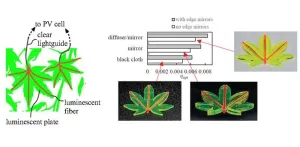(Press-News.org) COLUMBUS, Ohio (August 16, 2024) – Building positive connections with teachers and peers in the classroom can be critical to the mental health and academic success of children and adolescents. Yet, a new national poll from The Kids Mental Health Foundation, conducted by Ipsos, finds half of parents believe spending too much time on technology and social media hinder children from making meaningful connections as they head into the upcoming school year.
The poll, conducted by Ipsos on behalf of The Kids Mental Health Foundation, highlights top reported challenges for kids in forming classroom connections. According to more than 1,000 parents surveyed across the United States, the top challenges are:
Too much time with technology (50%)
Bullying (30%)
Social impact of the pandemic (22%)
Differences in culture and background can also be a factor, with about one in five parents (19%) reporting children struggle to make connections at school because they don’t feel like they fit in because of their race, ethnicity, culture, socioeconomic status, or gender identity.
“We know connections help foster a sense of belonging and when kids feel like they belong at school, they perform better academically and live healthier lives overall. Belonging is especially important to the adjustment and acculturation of immigrant children,” said Ariana Hoet, PhD, executive clinical director of The Kids Mental Health Foundation and a pediatric psychologist at Nationwide Children’s Hospital. “Technology is not all good or all bad, but parents should look for warning signs if you feel your child’s balance with technology use is affecting their real-world social connections.”
Warning signs parents should watch for to help determine whether their child is spending too much time on social media, gaming or other screens include:
Losing track of time. Check to see if your child is being honest about the amount of time they are spending on devices.
Being preoccupied/Distracted. Observe if your child urgently feels a need to return to their device(s) or screens during offline activities.
Isolating. Look for a lack of interest in “real life” social connections and activities.
Irritability. Watch for signs of anger or irritability while playing (which could include throwing a controller, yelling or breaking things).
Physical health effects. Keep an eye out for drops in sleep or physical activity, changes in eating patterns or an increased focus on appearance.
Changes in offline activities. Watch for negative changes to interactions or relationships with family or friends, and decreased school performance.
The survey also finds connection-based concerns for kids include fitting in (14%), making new friends in class (17%), being bullied or excluded (13%), and making new friends in sports and extracurricular activities (5%).
“The good news is that teachers and parents can help increase feelings of belonging in children,” said Dr. Hoet. “However, we have to keep in mind that this may be harder for immigrant parents who may not understand the school system and culture.”
To help children of marginalized or underrepresented groups experience greater feelings of belonging, parents, caregivers and more can:
Find mentors to model positive behavior. Your child may benefit from connecting with family, friends, relatives or even kids a few years older. Hearing that others who look like your child have successfully navigated high school or college may give them the confidence to increase their sense of belonging.
Seek out settings where your child fits in. Underrepresented kids may not feel connected at school, but they might enjoy clubs or cultural organizations where they have something in common with others in the room. The more places your child experiences social connectedness, the better.
Check in with your child. Find out how they’re feeling at school or in other social venues. Make sure they aren’t experiencing online bullying or receiving negative feedback on social media, because hurtful online experiences can harm a child’s real-world perception of belonging. Take time to help kids who feel like they don’t fit in.
The Kids Mental Health Foundation, founded by Nationwide Children’s, provides expert-backed content for parents, caregivers and teachers. Resources like Signs Your Child is Stuck on Screens, Talking to Kids about Social Media, Why School Belonging Matters, Boosting School Connections and 10 Ways to Combat Bullying, can help teachers and caregivers increase the protective factors around children, like school belonging and adult-child connections, and boost the mental health of young students.
For more resources, please visit KidsMentalHealthFoundation.org.
About the survey:
This Kids Mental Health Foundation/Ipsos poll was conducted August 2-4, 2024, by Ipsos using the probability-based KnowledgePanel®. This poll is based on a nationally representative probability sample of 1,146 adult parents of children under the age of 18. The survey has a margin of error of ± 3.1 percentage points at the 95% confidence interval for all respondents.
The Kids Mental Health Foundation is the leading organization promoting mental health for children in the United States. To achieve its vision to build a world where mental health is a vital part of every child’s upbringing, more than 1,000 mental health professionals and researchers at Nationwide Children’s Hospital, in partnership with other trusted experts, provide real-world knowledge and expertise to power the Foundation’s free educational videos, guides and curriculum. Launched in 2018 as The On Our Sleeves Movement for Children’s Mental Health, the organization recently expanded its mission as The Kids Mental Health Foundation to reflect the belief that emotional and physical wellbeing should be treated the same. To date, more than 15 million people have engaged with the Foundation’s materials, empowering parents, caregivers, educators, coaches and employers as the guiding force for children’s mental health all across the United States.
END
New poll finds 50% of parents believe too much time on technology hinders kids from forming connections in the classroom
The Kids Mental Health Foundation provides tools to help parents and teachers focus on building belonging in the upcoming school year, citing academic and mental health benefits
2024-08-16
ELSE PRESS RELEASES FROM THIS DATE:
How policing impacts the homeless
2024-08-16
People who are homeless often endure constant and intrusive police interactions, leaving them feeling intimidated, harassed and stigmatised, a new study finds.
More people of all ages and backgrounds are finding themselves homeless, often due to job loss or illness, as well as a lack of affordable housing. Between 2016 and 2021 homelessness increased by 5.2% in Australia.
Professor of Law Thalia Anthony from the University of Technology Sydney (UTS) said the research aimed to give a voice to people experiencing homelessness ...
Scottish and Irish rocks confirmed as rare record of ‘snowball Earth’
2024-08-16
A rock formation spanning Ireland and Scotland may be the world’s most complete record of “snowball Earth”, a crucial moment in planetary history when the globe was covered in ice, finds a new study led by UCL (University College London) researchers.
The study, published in the Journal of the Geological Society of London, found that the Port Askaig Formation, composed of layers of rock up to 1.1km thick, was likely laid down between 662 to 720 million years ago during the Sturtian glaciation – the first of two global freezes thought to have ...
Research provides a roadmap for improving electrochemical performance
2024-08-16
Thomas Edison went through thousands of materials before he finally found the right tungsten filament to create a working lightbulb. This type of trial-and-error research continues today and is responsible for countless inventions that improve our world. Battery systems that help power our lives in many seen (and unseen) ways are one example.
However, improving these materials and devices requires more than experimentation. Modern engineers must also form a deeper understanding of the general principles that govern material performance, from which they can design better materials to achieve challenging product requirements.
In a paper ...
Females’ and males’ muscles differ in sugar and fatty acid handling
2024-08-16
Females’ and males’ muscles differ in glucose and fatty acid handling – but regular physical activity quickly triggers similar beneficial metabolic changes in the muscles of both sexes, new research to be presented at this year’s Annual Meeting of the European Association for the Study of Diabetes (EASD) (Madrid, 9-13 September) has found.
Exercise has a potent effect on skeletal muscle and is the most effective strategy to prevent weight loss-related muscle loss and type 2 diabetes. ...
USDA-NIFA awards $300K to study food safety, plant pathogens and pests in hydroponics
2024-08-15
FAYETTEVILLE, Ark. — As controlled environment agriculture and vertical farming gain a greater foothold in modern agriculture, a new $300,000 grant aims to enhance hydroponic lettuce production.
Kristen Gibson, director of the Arkansas Center for Food Safety and Arkansas Agricultural Experiment Station faculty member, is the lead researcher on the grant from the U.S. Department of Agriculture’s National Institute of Food and Agriculture. Gibson says the grant provides an opportunity to meet the needs of the hydroponics industry.
“The industry is always looking for what’s going to help them grow the best product, increase profit and ...
YALE NEWS: Brain wiring is guided by activity even in very early development
2024-08-15
New Haven, Conn. — In humans, the process of learning is driven by different groups of cells in the brain firing together. For instance, when the neurons associated with the process of recognizing a dog begin to fire in a coordinated manner in response to the cells that encode the features of a dog — four legs, fur, a tail, etc. — a young child will eventually be able to identify dogs going forward. But brain wiring begins before humans are born, before they have experiences or senses like sight to guide this cellular circuitry. How does that happen?
In a new ...
Eyes on the field: How Texas A&M researchers are working to revolutionize NFL officiating
2024-08-15
Hamza Memon and Nicholas Panzo, students at Texas A&M University School of Engineering Medicine (ENMED), are leading an innovative project at the intersection of sports and ophthalmology to improve National Football League (NFL) officiating . Rooted deeply in Houston’s vibrant sports culture, these Class of 2026 students combine their interest in ophthalmology and their love for sports to contribute significantly to a groundbreaking project with the NFL.
The two students met during a summer engineering program and quickly bonded over their shared aspirations in sports and ophthalmology. This friendship led ...
Blind cavefish have extraordinary taste buds
2024-08-15
Over thousands of years, cavefish evolved and lost their vision, earning the moniker “the blind cavefish,” but some cavefish also developed an inordinate number of taste buds on the head and chin.
In a new study, now published in the Nature journal Communications Biology, scientists at the University of Cincinnati have determined when the taste buds start to appear in areas beyond the oral cavity. The study was supported by the National Science Foundation.
To begin, blind cavefish evolved in cave ponds in northeastern Mexico. They are pale pink and nearly translucent compared to their silvery counterparts ...
What the trained eye cannot see: Detecting movement defects in early stage Parkinson's disease
2024-08-15
A technique that uses videos and machine learning to quantify motor symptoms in early-stage Parkinson’s disease could help reveal signs of the disease and other movement disorders earlier, which could lead to better treatment outcomes.
In a study just published in Parkinsonism and Related Disorders, a team of researchers from the University of Florida and the Fixel Institute for Neurological Diseases shows that video assessment can help detect early Parkinsonism in an individual by comparing the movement of the left and right sides of their body. The approach, researchers say, exploits the fact ...
Leaf-like solar concentrators promise major boost in solar efficiency
2024-08-15
Since its invention in the 1970s, the luminescent solar concentrator (LSC) has aimed to enhance solar energy capture by using luminescent materials to convert and concentrate sunlight onto photovoltaic (PV) cells. Unlike traditional concentrators that rely on mirrors and lenses, LSCs can harvest diffuse light and have been used in applications such as building-integrated photovoltaics, where their semitransparent and colorful nature offers aesthetic benefits. However, scaling up LSCs to cover large areas has been challenging due to issues like self-absorption of photoluminescent (PL) photons within the waveguide. Researchers ...
LAST 30 PRESS RELEASES:
Scientists show how to predict world’s deadly scorpion hotspots
ASU researchers to lead AAAS panel on water insecurity in the United States
ASU professor Anne Stone to present at AAAS Conference in Phoenix on ancient origins of modern disease
Proposals for exploring viruses and skin as the next experimental quantum frontiers share US$30,000 science award
ASU researchers showcase scalable tech solutions for older adults living alone with cognitive decline at AAAS 2026
Scientists identify smooth regional trends in fruit fly survival strategies
Antipathy toward snakes? Your parents likely talked you into that at an early age
Sylvester Cancer Tip Sheet for Feb. 2026
Online exposure to medical misinformation concentrated among older adults
Telehealth improves access to genetic services for adult survivors of childhood cancers
Outdated mortality benchmarks risk missing early signs of famine and delay recognizing mass starvation
Newly discovered bacterium converts carbon dioxide into chemicals using electricity
Flipping and reversing mini-proteins could improve disease treatment
Scientists reveal major hidden source of atmospheric nitrogen pollution in fragile lake basin
Biochar emerges as a powerful tool for soil carbon neutrality and climate mitigation
Tiny cell messengers show big promise for safer protein and gene delivery
AMS releases statement regarding the decision to rescind EPA’s 2009 Endangerment Finding
Parents’ alcohol and drug use influences their children’s consumption, research shows
Modular assembly of chiral nitrogen-bridged rings achieved by palladium-catalyzed diastereoselective and enantioselective cascade cyclization reactions
Promoting civic engagement
AMS Science Preview: Hurricane slowdown, school snow days
Deforestation in the Amazon raises the surface temperature by 3 °C during the dry season
Model more accurately maps the impact of frost on corn crops
How did humans develop sharp vision? Lab-grown retinas show likely answer
Sour grapes? Taste, experience of sour foods depends on individual consumer
At AAAS, professor Krystal Tsosie argues the future of science must be Indigenous-led
From the lab to the living room: Decoding Parkinson’s patients movements in the real world
Research advances in porous materials, as highlighted in the 2025 Nobel Prize in Chemistry
Sally C. Morton, executive vice president of ASU Knowledge Enterprise, presents a bold and practical framework for moving research from discovery to real-world impact
Biochemical parameters in patients with diabetic nephropathy versus individuals with diabetes alone, non-diabetic nephropathy, and healthy controls
[Press-News.org] New poll finds 50% of parents believe too much time on technology hinders kids from forming connections in the classroomThe Kids Mental Health Foundation provides tools to help parents and teachers focus on building belonging in the upcoming school year, citing academic and mental health benefits




